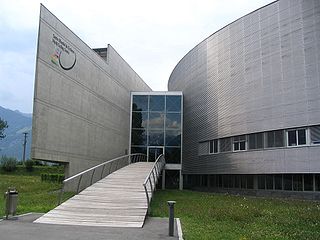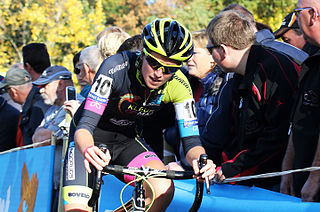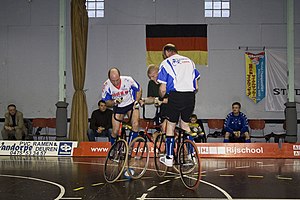
Track cycling is a bicycle racing sport usually held on specially built banked tracks or velodromes using purpose-designed track bicycles.

The Union Cycliste Internationale is the world governing body for sports cycling and oversees international competitive cycling events. The UCI is based in Aigle, Switzerland.

Manchester Velodrome is an indoor Olympic-standard cycle-racing track in Manchester, England, which opened in 1994. Part of the National Cycling Centre, the facility has been home to British Cycling since 1994, coinciding with the nation's rise to track cycling dominance at World and Olympic level. The velodrome was also home to UCI ProTeam Ineos Grenadiers, formerly known as Team Sky between 2010 and 2019, a period when the team won 6 Tour de France, 2 Vuelta a Espana and 1 Giro d'Italia with Great Britain riders.

Cyclo-cross is a form of bicycle racing. Races typically take place in the autumn and winter, and consist of many laps of a short course featuring pavement, wooded trails, grass, steep hills and obstacles requiring the rider to quickly dismount, carry the bike while navigating the obstruction and remount. Races for senior categories are generally between 40 minutes and an hour long, with the distance varying depending on the ground conditions. The sport is strongest in the traditional road cycling countries such as Belgium, France and the Netherlands.
Cycle sport is competitive physical activity using bicycles. There are several categories of bicycle racing including road bicycle racing, cyclo-cross, mountain bike racing, track cycling, BMX, and cycle speedway. Non-racing cycling sports include artistic cycling, cycle polo, freestyle BMX, mountain bike trials, hardcourt bike polo and cycleball. The Union Cycliste Internationale (UCI) is the world governing body for cycling and international competitive cycling events. The International Human Powered Vehicle Association is the governing body for human-powered vehicles that imposes far fewer restrictions on their design than does the UCI. The UltraMarathon Cycling Association is the governing body for many ultra-distance cycling races.

British Cycling is the main national governing body for cycle sport in Great Britain. It administers most competitive cycling in Great Britain, the Channel Islands and the Isle of Man. It represents Britain at the world body, the Union Cycliste Internationale (UCI) and selects national teams, including the Great Britain (GB) Cycling Team for races in Britain and abroad. As of 2020, it has a total membership of 165,000.

Road bicycle racing is the cycle sport discipline of road cycling, held primarily on paved roads. Road racing is the most popular professional form of bicycle racing, in terms of numbers of competitors, events and spectators. The two most common competition formats are mass start events, where riders start simultaneously and race to a set finish point; and time trials, where individual riders or teams race a course alone against the clock. Stage races or "tours" take multiple days, and consist of several mass-start or time-trial stages ridden consecutively.

Cycle polo, bicycle polo, or bike polo is a team sport, similar to traditional polo, except that bicycles are used instead of horses. There are two versions of the sport: Hardcourt Bike Polo and grass court bike polo. The hardcourt game saw a sharp spike in interest in the first decade of the 21st century and new teams are sprouting up across the world in China, Canada, Ireland, Switzerland, France, India, Germany, Pakistan, Ukraine, Russia, Malaysia, Sri Lanka, Indonesia, Hungary, Australia, New Zealand, Sweden, England, Scotland, Argentina, Italy, Spain, United States, Poland, Croatia, Slovenia, Lithuania, Nepal, Brazil and Cuba.

Artistic cycling is a form of competitive indoor cycling in which athletes perform tricks for points on specialized, fixed-gear bikes in a format similar to ballet or gymnastics. The exercises are performed in front of judges in five-minute rounds by singles, pairs, four- or six-person teams.
Sport in Belgium plays a prominent role in the society. As of 2010, Belgium counted around 17,000 sport clubs with approximately 1.35 million members, or about 13% of the Belgian population. Popular sports in Belgium are, among others: football, cycling, tennis, table tennis, athletics, swimming, basketball, badminton, judo, hockey, rowing, motocross, auto racing, volleyball, and running. Belgium has organized the 1920 Olympic Games in Antwerp as well as the 1972 UEFA European Championship and the 2000 UEFA European Championship along with the Netherlands. The Belgium national football team's best result was a 3rd place at the 2018 FIFA World Cup and a second place of the 1980 UEFA European Championship. Belgian football clubs have won 3 times the UEFA Cup Winners' Cup and twice the UEFA Cup, plus 3 times the UEFA Supercup.

The German Cycling Federation or BDR is the national governing body of cycle racing in Germany.

Hardcourt Bike Polo is a fast-paced, gender-inclusive team sport played on a hard, smooth, enclosed court. Three players per team ride bicycles and use mallets to hit a small ball into the opposing team's goal while avoiding physical contact with the ground. From its emergence in the 1990s, the sport benefited greatly from in the 2010s' bike boom seeing the formation of international clubs and the growth of a strong tournament culture. Drawing from aspects of team sports and cycling, its unique blend of brutal difficulty, finesse, physicality and flow attracts spectators and players alike, creating a passionate and vibrant sporting culture.

The UCI World Championships are annual competitions promoted by the Union Cycliste Internationale (UCI) to determine world champion cyclists. They are held in several different styles of racing, in a different country each year. Championship winners wear a white jersey with coloured bands around the chest for the following year. The similarity to the colours of a rainbow gives them the colloquial name of "the rainbow jersey." The first three individuals or teams in each championship win gold, silver and bronze medals. Former world champions are allowed to wear a trim to their collar and sleeves in the same pattern as the rainbow jersey.

Caroline Sarah J. Alexander is a cross-country mountain biker and road cyclist born in Barrow-in-Furness. She was a swimmer as a child and did not cycle until she was 20. She first rode a bike in competition in a triathlon: she came second in the swimming and was fastest on the bike. She entered her first mountain bike race, which she won. Within a year she was one of the top three mountain-bike racers in the UK. She left her job as a draughtswoman in Barrow shipyards and became a full-time cyclist.
Cycling in Australia is a common form of transport, recreation and sport. Many Australians enjoy cycling because it improves their health and reduces road congestion and air pollution. The government has encouraged more people to start, with several state advertising campaigns aimed at increasing safety for those who choose to ride. There is a common perception that riding is a dangerous activity. While it is safer to walk, cycling is a safer method of transport than driving. Cycling is less popular in Australia than in Europe, however cyclists make up one in forty road deaths and one in seven serious injuries.

The Cycle Messenger World Championships, or CMWCs, are an annual urban cycling competition whereby cycle messengers and cycling enthusiasts showcase their skills in an array of events, many of which simulate everyday tasks for a cycle messenger. Each year, the CMWCs are held in a different city around the world, with each host city designing its own unique course. The highlight of the CMWCs is the main race in which cyclists are given manifests and must pickup and deliver items to various locations around the host city as quickly and efficiently as possible. The total number of pickups and deliveries, or "drop offs" is unknown to the messengers before the race, but has been known to reach up to 100 stops and usually takes between 3–4 hours to complete. The cyclist who completes all of the assigned deliveries in the least amount of time wins the race. In addition to the main race there are also several side events which have become increasingly popular over the past few years. These events change yearly depending on the discretion of the host city but usually include backward circles, bike polo, bunnyhop, cargo race, longest skid, sprints, and trackstand.

Motor doping, or mechanical doping, in competitive cycling terminology, is a method of cheating by using a hidden motor to help propel a racing bicycle. The term is an analogy to chemical doping in sport, cheating by using performance-enhancing drugs. As a form of "technological fraud" it is banned by the Union Cycliste Internationale, the international governing body of cycling.
This article contains lists of achievements in major cycling competitions according to first-place, second-place and third-place results obtained by cyclists representing different nations. The objective is not to create combined medal tables; the focus is on listing the best positions achieved by cyclists in major international competitions, ranking the nations according to the most podiums accomplished by cyclists of these nations. All major World Championships organized by Union Cycliste Internationale are covered, as well as cycling events at the Olympic Games.

Gravel cycling, gravel biking or gravel grinding is a sport, or a leisure activity, in which participants ride bicycles mostly on gravel roads. Sometimes, specially designed gravel bikes are used; in other cases, any bicycle capable of covering the terrain can be used.
















